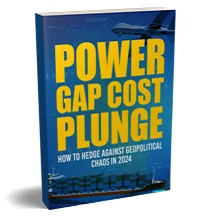
What surprised the stock market were Fed Chair Jay Powell’s words that followed the official statement. Powell repeatedly said the Fed needs more “confidence” that it has consumer price inflation licked.
Powell also said it won’t likely cut rates at its next meeting in March. This comment had the effect of a turd in a swimming pool. Stocks abruptly sold off. The S&P 500 closed the day down 1.6 percent and the NASDAQ dropped 2.2 percent. Shares of Alphabet slid 7 percent, after reporting poor ad revenues.
The Fed continues to find itself in a precarious position. Consumer price inflation remains above its 2 percent target. Yet some regional banks are hemorrhaging cash.
Case in point, on Wednesday shares of New York Community Bancorp crashed 38 percent. This came after it reported a fourth quarter loss of $252 million.
To this end, the Fed deleted the sentence, “The U.S. banking system is sound and resilient,” from its latest statement.
Make of this what you will. As far as we can tell, there’s another brewing banking crisis in regional banks that could boil over later this year.
Thus, the Fed needs to ready a large pool of liquidity to bail out the banks when the crisis hits. How to do this while also staying tough on consumer price inflation is a question without a good answer.
We’ll have some thoughts on what this all means in just a moment. But first, proper context is in order.
Deep Time
Writer John McPhee first elaborated something he called ‘deep time.’ He used this as a way to describe the sense of time whose units are not days, hours, minutes, or seconds, but millions of years or tens of millions of years.
The consideration of such an elongated – deep time – scale dwarfs the human lifespan, reducing it to a speck of nothingness.
A friend recently remarked that people put too much concern in the Federal Reserve and what it is doing. Certainly, over the deep time duration of the rise and fall of the Himalayan Mountain Range the Fed’s decision to hold interest rates steady has zero significance.
Nonetheless, we still consider it. What choice do we have?
We are human like you are human. And we all live in a centrally planned credit market. That’s fabricated by a committee of unelected bureaucrats for the interest of the big banks. We have no say in the matter.
What the central planners are doing in the minutes and days that make up the here and now may have little bearing in the context of deep time. But it cannot be ignored. There are implications that impact your life, steal your security, and erode your family’s future.
This is our fundamental gripe on the matter. Labors derive value, which is compensated for with money. The problem, however, is that the money has been corrupted in favor of bankers and big government spenders and their associated beneficiaries.
Not only is this fundamentally unfair. It also breeds disharmony and chaos.
Extreme Malinvestment
As 2024 lurches about like a three-legged monster. As new all-time stock market highs are notched on a near daily basis. As presidential election politics advance with senseless logic. As geopolitical hotspots boil over. As domestic strife amps up to full discord.
Take solace in knowing with utmost certainty that the malinvestment the Fed and Treasury have jointly provoked over the last 40 years will not only become more extreme. But will become exceptionally more extreme.
Madness will give way to even greater madness. Stock market bubbles will inflate before they inflate some more. Reckless speculators will garner outsized returns and outsized egos. Fund managers will gamble on technology stocks so their performance can keep up with the index benchmarks.
In fact, up until the moment of the great crash, nothing will make sense if you use simple logic to understand what it is that’s going on. How could it?
The passions of a late-stage technology driven stock market melt up are highly irrational. Greed outweighs all critical sensibilities. Fear of missing out compels the blind to lead the blind. Go big or go home.
At the same time, fundamental analysis is thrown off its rocker. Historical means are tossed in the garbage can. Honest investing takes a backseat to riverboat gambling.
The Fed’s monetary policy may be holding steady, for now. But Washington’s fiscal spending is absolutely insane.
The latest Monthly Treasury Statement, which covers the first quarter of the 2024 fiscal year, shows Washington has already racked up a budget deficit of $510 billion. At that rate, Washington is on target to run a $2.4 trillion deficit in FY2024.
Do You Have a Passion for Political Solutions?
Like the chaos created by central bankers, the chaos of mega deficit spending by Washington follows an illogical logic of its own.
Why, for any logical reason, would President Biden halt approvals of LNG exports at a time when European allies have grown increasingly dependent on American natural gas?
Has Biden been huffing gas? Does this really have to do with global climate change, as he claims? Is the earth really getting warmer? And, if so, is the burning of carbon-based fuels the culprit?
The answers to these questions really do not matter. What really matters is the passion for political solutions. And how those passions can be manifested to siphon off the spoils of workers and savers for the benefit of the insiders.
Renewable energy – like defense, education, finance, healthcare, and many others – is an industry that is fueled by government meddling. This creates pockets of apparent wealth that are financed by malinvestment.
Were it not for government policies, the companies and individuals involved would be elsewhere, doing other things. Instead, they’re busy advancing projects in an industry of seeming prosperity.
Alas, the heavy hand of government intervention into the economy will continue until the government debt pyramid finally collapses. This will be followed by an extended, dark ages like period of power fragmentation.
But until then, every garden variety recession or deep depression will be combated with larger spending programs, and debt based malinvestment. And greater madness and insanity will follow.
Choose your spots wisely.
Sincerely,
MN Gordon
for Economic Prism
Return from Do You Have a Passion for Political Solutions? to Economic Prism





